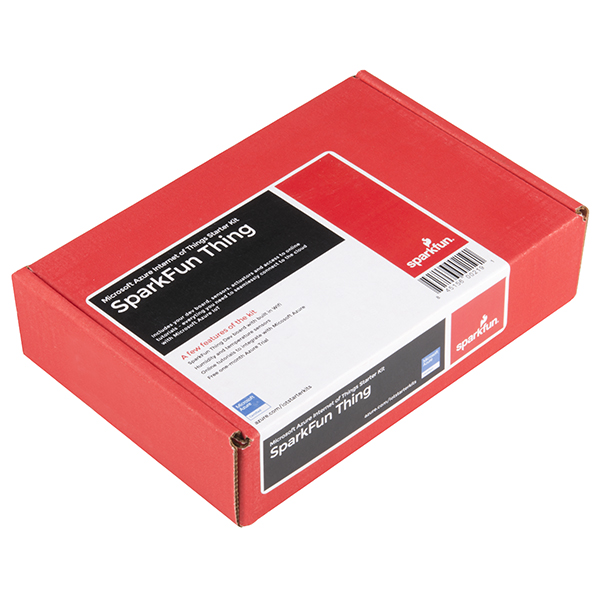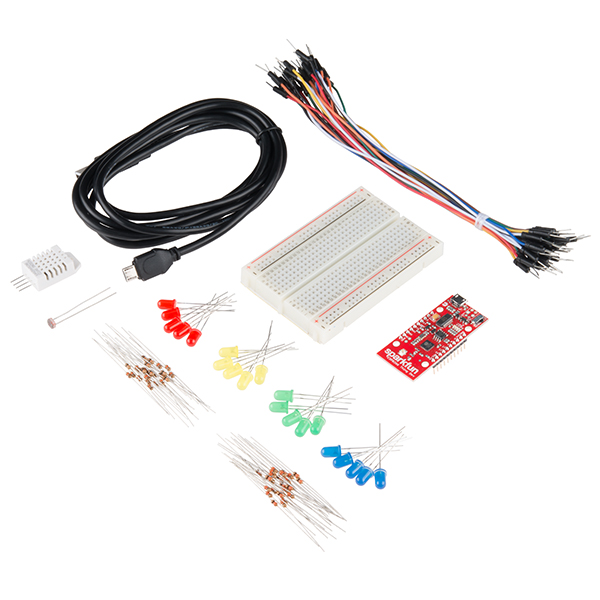Microsoft Azure IoT Starter Kit - SparkFun Thing
Microsoft and SparkFun have teamed up to bring you some IoT (Internet of Things) fun. The Microsoft Azure IoT Starter Kit for the SparkFun Thing Development Board has been designed to help you seamlessly connect your device to the cloud with Microsoft Azure IoT. This kit includes an 'Azure certified for IoT' SparkFun Thing Dev Board, and a breadboard and wires to help you set up your circuits. There are also a variety of sensors such as a photoresistor to sense light as well as a humidity/temperature sensor to read the ambient temperature and humidity in a room (or outdoors with some weatherproofing). Once your board is connected to Microsoft Azure you can start visualizing and analyzing your data.
Microsoft Azure is a leading provider of cloud computing and Microsoft Azure IoT Hub enables secure, reliable bi-directional communications between IoT endpoints such as sensors and the cloud. Azure IoT Hub supports a broad set of operating systems (Linux, Windows, RTOS etc.), protocols and common languages, so you can configure your connections to the devices.
The SparkFun Thing Dev Board is based on the popular ESP8266 WiFi module. With it you have a simple microcontroller with built in WiFi to interface with your sensors, buttons, and LEDs that can be controlled from or post data to the web. Everything you need to get started from voltage regulation to a PCB antenna are built into the board. Just plug a USB cable into the board and you can actually start programming in the Arduino IDE or other environments.
Note: Microsoft Azure account sign up requires a credit card. Microsoft does state that this information is collected only to verify your identity and that you will not be charged unless you explicitly upgrade to a paid offer.
- SparkFun ESP8266 Thing - Dev Board (with Headers)
- Breadboard - Self-Adhesive (White)
- Humidity and Temperature Sensor - RHT03
- Mini Photocell
- LED - Assorted (20 pack)
- USB microB Cable - 6 Foot
- Jumper Wires Standard 7" M/M - 20 AWG (30 Pack)
- Resistor 10K Ohm 1/6th Watt PTH - 20 pack
- Resistor 330 Ohm 1/6 Watt PTH - 20 pack
Microsoft Azure IoT Starter Kit - SparkFun Thing Product Help and Resources
Core Skill: Programming
If a board needs code or communicates somehow, you're going to need to know how to program or interface with it. The programming skill is all about communication and code.
Skill Level: Rookie - You will need a better fundamental understand of what code is, and how it works. You will be using beginner-level software and development tools like Arduino. You will be dealing directly with code, but numerous examples and libraries are available. Sensors or shields will communicate with serial or TTL.
See all skill levels
Core Skill: Electrical Prototyping
If it requires power, you need to know how much, what all the pins do, and how to hook it up. You may need to reference datasheets, schematics, and know the ins and outs of electronics.
Skill Level: Rookie - You may be required to know a bit more about the component, such as orientation, or how to hook it up, in addition to power requirements. You will need to understand polarized components.
See all skill levels
Comments
Looking for answers to technical questions?
We welcome your comments and suggestions below. However, if you are looking for solutions to technical questions please see our Technical Assistance page.
Customer Reviews
5 out of 5
Based on 1 ratings:
3 of 3 found this helpful:
IOT success
Had to read through instructions multiple times and follow very carefully. Made several mistakes along the way. However, with patience and perseverance, was able to learn about how IOT devices are configured, programmed and deployed. Just what I was hoping.



I wished Sparkfun wrote a tutorial for this with step-by-step pictures. Following a text tutorial is hard and took me awhile to figure it out. Until then this might be helpful:
http://tinyurl.com/jz6ltrb
What's up with you guys consistently releasing almost identical products... at exactly.. or almost the same time as Adafruit?
Yep, this was a collaboration with Microsoft. Why they seemed to work with 2 different companies to product 2 'almost identical products' is a question for them.
In this case because they both partnered with Microsoft and these packages were announced at Build 2016 on 31-Mar-2016. Look for the day 2 keynote, or see this page: https://azure.microsoft.com/en-us/develop/iot/starter-kits/